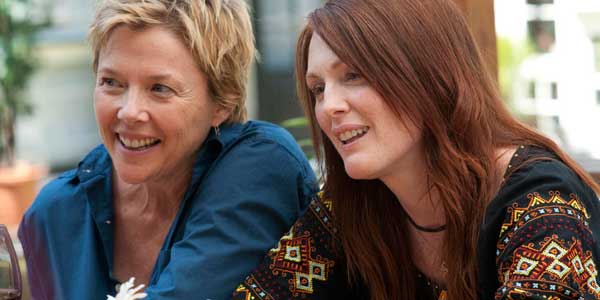
Director: Lisa Cholodenko
Running Time: 101 mins
Certificate: 15
Release Date: 21st March, 2010

What a confusing movie The Kids Are All Right is. Kids with two mothers? What craziness! Whoever heard of such as thing! And it has two women living in the same house, both of whom have fathered a child by the same sperm donor! Nuttiness.
At one point, when Julianne Moore was under the bed covers between Annette Bening’s legs, I even thought they were trying to suggest these two mothers were having some sort of sexual relationship, but then I heard a strange buzzing sound coming from down there and realised Moore must have just lost her cell phone or something.
I was quite relieved, as I was worried this film might have been about those gays the liberal media’s always pretending exist. However it definitely can’t be about gays, because as we all know, if two children were raised by same sex parents, they’d turn out to be serial killers or they’d spend all their time eating babies or something, and the kids in this movie seem quite normal.
So basically this film is about two not-gay-at-all-in-any-way women who happen to live together, share the same bed, raise their two children together and occasionally like to kiss (purely showing bon-ami, of course). Both kids share the same sperm donor, although each of the women is the biological mother of only one of them. With the eldest, Joni (Wasikowska), now 18 and about to leave for college, she’s old enough to phone up the sperm bank and ask for them to contact her biological father and see if he would like contact with her.
At the urging of her curious younger brother, Laser (Hutcherson), Joni calls and soon receives a response from Paul (Ruffalo), the man who donated sperm as a young man. He is now 20 years older but still drifting through life with little sense of purpose or direction. While he tries to be a decent person, he’s a slightly less desirable father figure than his description at the sperm bank had made his out to be all those years before.
Joni and Laser initially want to keep their meeting with Paul secret from their mothers, particularly the uptight Nic (Bening), but soon everything spills out, leading to Paul colliding into all their lives. However what at first seems like it could be a difficult but positive experience for everyone takes a problematic turn when Jules (Moore) becomes a bit too close to Paul, partly in response to the tensions in her relationship with Nic.
While The Kids Are All Right has it problems, particularly a slightly weak ending and the fact it very occasionally threatens to become more melodrama than dramedy, it’s a largely excellent look into one family’s life.
It’s particularly gratifying that the film doesn’t try to say there would be no differences at all in a gay family – after all, few straight couples have to deal with their kids hooking up with their sperm donor father, although of course it’s possible – instead suggesting that these distinctions pale in comparison to the similarities, such as the encroachment of middle-age and the desire to feel purpose in life beyond just being a parent (or in Paul’s case, the opposite feeling that perhaps suddenly being a parent could give him some purpose).
It presents a family where most of the differences are just that, different, rather than being better or worse than the many and varied ways straight people deal with family life and the issues it raises. Here problems stem not purely from the living arrangements, but from the fact that gay or straight, people are people, and sometimes things go wrong and you’re faced with tough and/or unusual situations that you deal with the best you can (or fail to deal with the best you can).
As evidenced by the Golden Globe for Annette Bening (it also won Best Picture, although I’m not sure whether it should have been in the ‘comedy or musical’ section), Oscar nods for her and Mark Ruffalo, as well as a BAFTA nomination for Moore, the acting in The Kids Are All Right is terrific. While there’s little doubt everyone’s at the top of their game, much credit for this also needs to go to the script by Lisa Cholodenko and Stuart Blumberg. While it has a few little weaknesses, it presents often lengthy vignettes into the character’s lives that really allow the actors to go to town and explore these people in deep and interesting ways that it would be difficult to do with a less careful scripts. It was great the screenplay got a little attention from the Oscars with a nomination – and there was a worthy Best Picture nod too.
As for the Blu-ray itself, it’s okay but the picture is a little grainy, largely due to the fact this isn’t a big budget film, and so sharpness is limited by the cameras used to capture the image. It’s perfectly fine and certainly the colours are good, but just don’t expecting absolute HD perfection. Likewise the audio is decent and clear, but as this is a film that’s more about talking than whizz-bang sound effects, it’s not like it is – or even should be – astounding to listen to.
It’s a shame though that the special features aren’t more extensive. There are three featurettes, all of which have the potential to be very interesting, but which are so short they feel as if they’re over before they’ve begun. For example ‘The Writer’s Process’ sees Cholodenko and Blumberg starting to talk about how they began collaborating and the difficulties their work relationship faced, but they’ve barely begun when it’s all over in a couple of minutes. Cholodenko’s commentary is worth a listen too though, as while she sometimes overthinks things, she’s generally very interesting.
Overall Verdict: The Kids Are All Right may not be perfect, but it’s still a wonderfully observed look into human relationships, showing that while gay parents may be different, they’re also very much the same.
Special Features: ‘The Journey To Forming A Family’ Featurette, ‘The Making Of The Kids Are All Right’ Featurette, ‘The Writer’s Process’ Featurette, Audio Commentary With Director/Writer Lisa Cholodenko
Reviewer: Tim Isaac





Leave a Reply (if comment does not appear immediately, it may have been held for moderation)